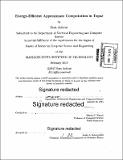Energy-efficient approximate computation in Topaz
Author(s)
Achour, Sara
DownloadFull printable version (5.985Mb)
Other Contributors
Massachusetts Institute of Technology. Department of Electrical Engineering and Computer Science.
Advisor
Martin C. Rinard.
Terms of use
Metadata
Show full item recordAbstract
The increasing prominence of energy consumption as a first-order concern in contemporary computing systems has motivated the design of energy-efficient approximate computing platforms. These computing platforms feature energy-efficient computing mechanisms such as components that may occasionally produce incorrect results. We present Topaz, a new task-based language for computations that execute on approximate computing platforms that may occasionally produce arbitrarily inaccurate results. The Topaz implementation maps approximate tasks onto the approximate machine and integrates the approximate results into the main computation, deploying a novel outlier detection and reliable re-execution mechanism to prevent unacceptably inaccurate results from corrupting the overall computation. Because Topaz can work effectively with a very broad range of approximate hardware designs, it provides hardware developers with substantial freedom in the designs that they produce. In particular, Topaz does not impose the need for any specific restrictive reliability or accuracy guarantees. Experimental results from our set of benchmark applications demonstrate the effectiveness of Topaz in vastly improving the quality of the generated output while only incurring 0.2% to 3% energy overheard.
Description
Thesis: S.M. in Computer Science and Engineering, Massachusetts Institute of Technology, Department of Electrical Engineering and Computer Science, 2015. Cataloged from PDF version of thesis. Includes bibliographical references (pages 69-73).
Date issued
2015Department
Massachusetts Institute of Technology. Department of Electrical Engineering and Computer SciencePublisher
Massachusetts Institute of Technology
Keywords
Electrical Engineering and Computer Science.